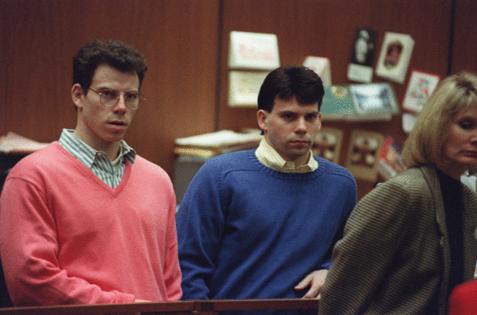America's Menendez brothers shouldn’t be doing more prison time than war criminals
PARIS — Those of us who were around on the West Coast in the’ 90s remember the story of Lyle and Erik Menendez, aged 18 and 21 at the time, who, in 1989, killed their parents with multiple shotgun blasts. The case was part of a patchwork of high- profile local dramas that gripped the nation, along with the O.J. Simpson murder trial, Rodney King riots and the 1989 San Francisco earthquake.
After an initial mistrial, the Menendez brothers were retried and convicted of first- degree murder, sent to prison in 1996 for two consecutive life sentences without parole, and effectively memory-holed. Until now.
A new- nine part Netflix series, “Monsters: The Lyle and Erik Menendez Story,” is introducing a new generation to the case. The same generation that has grown up in the long shadow of the “#MeToo” movement, popularized on social media, which has encouraged victims to speak out about abusive behavior, particularly of a sexual nature, that was previously tolerated, downplayed or outright dismissed. From the U.S. to here in France, this newfound awareness has led to job dismissals, criminal trials and convictions of powerful individuals, arguably the most prominent being former Hollywood mogul, Harvey Weinstein, convicted in California last year of rape and sentenced to 16 years in prison.
The Netflix show uses the Rashomon effect to tell the story from the perspective of each of the people involved, based on available court and other materials. It focuses on the abuse that the brothers claimed to have suffered at the hands of their father — Hollywood RCA executive, Jose Menendez, known for working with the boy band, Menudo — and their mother, whom the brothers considered complicit.
The abuse evidence was compelling enough to deadlock an initial jury. In the second trial, the judge excluded it entirely.
Jose Menendez in today’s world would have been considered a #MeToo villain straight out of Central Casting. Beyond the multitude of relatives who testified to sexual and other abuse in the initial trial, details emerged last year in court filings by a onetime Menudo member alleging that as a young teen he was drugged and raped in hotels twice by Jose Menendez.
A letter written by Erik Menendez to his cousin was also recently discovered in a storage locker by the brothers’ aunt. Dated months before the murders, it reads, “I’ve been trying to avoid dad. It’s still happening Andy, but it’s worse for me now. … I never know when it’s going to happen and it’s driving me crazy. Every night, I stay up thinking he might come in. I need to put it out of my mind."
Should this new evidence lead to the exoneration of two men who have been imprisoned for 34 years? Self- defense in response to abuse generally means a manslaughter conviction. But the brothers had options other than just offing their parents while they chilled on the couch at home. The courts have been clear that any threat of abuse has to be imminent. Still, there has been a shift in how society feels about abuse, and an increasing reluctance to relegate it to a mere epiphenomenon.
Frankly, all of this is almost beside the point when Lyle and Erik have been locked away for more than three decades, which is longer than the maximum sentencing guidelines of the International Criminal Court’s Rome Statute for genocide, war crimes and crimes against humanity like extermination, systemic torture, mass enslavement and apartheid. The maximum penalty for these crimes “may not exceed a maximum of 30 years,” according to international law, except when “justified by the extreme gravity of the crime and the individual circumstances of the convicted person.”
We’re talking here about genocide.
The U.S. isn’t actually signatory to the Rome Statute, mostly to avoid the prosecution of its own military and officials under it, but the human rights principles it defines are no less valid. So why don’t they apply to these men?
Just north of the U.S. border, the Canadian Supreme Court ruled in 2022 that any more than 25 years in prison without the possibility of parole, for any number of consecutive life sentences, is both cruel and unconstitutional. According to the high court, zero possibility of having any life or any incentive to reform and reintegrate is comparable to death — “since only death will end their incarceration.”
Is Canada really any more dangerous a place than the U.S. because it’s most serious criminals get a chance to prove themselves after 25 years? Hardly. No one’s like, “Oh, 25 years in jail makes it totally worth killing someone.”
The Menendez brothers are reportedly model prisoners at the Richard J. Donovan Correctional Facility near San Diego, working on various projects and counseling other inmates, with Lyle having just graduated from a UC Irvine prison program with a bachelor of arts in sociology.
This shouldn’t be a partisan issue. Former President Donald Trump championed and signed significant bipartisan federal prison and sentencing reforms in an effort to favor reintegration over mass incarcerations in a country that sets the world record for life sentences.
California Governor Gavin Newsom can grant pardons or commute sentences for state crimes. He really needs to in this case, in acknowledgment of international human rights laws on sentencing, with the current social climate on abuse as a mitigating factor. If he can spark a long overdue debate on state-level justice reform in doing so, then all the better.






































Comments